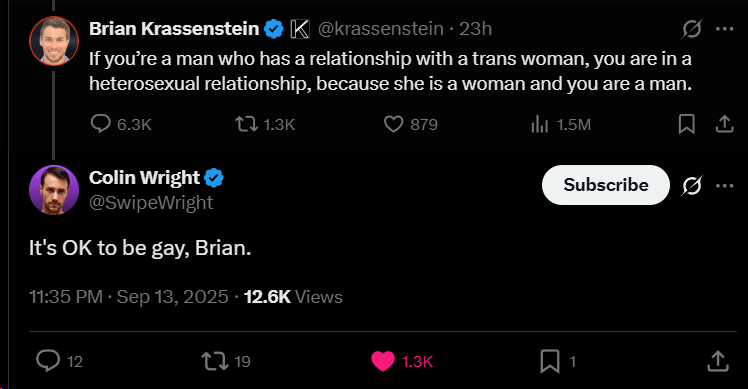The Anchor of Orientation
Why sex, not identity, grounds coherent categories of desire
A useful distinction must be drawn between two competing frameworks for defining sexual orientation: one anchored in biological sex, the other in gender identity. These frameworks are not compatible, because they yield contradictory classifications of the same relationships.
In the sex-based framework, heterosexuality is defined as attraction to the opposite sex, homosexuality as attraction to the same sex, and bisexuality as attraction to both. These categories were originally developed to describe empirical patterns of human desire relative to reproductive biology. They remain coherent precisely because they rely on an external and stable reference point: male and female as biological classes.
The identity-based framework, by contrast, grounds orientation in subjective self-identification. A man dating a trans woman is classified as heterosexual, not because of the sexes involved, but because of the declared genders. In this system, the categories lose their descriptive clarity and become contingent upon shifting identity claims. Homosexuality and heterosexuality can collapse into each other depending on the self-ascribed labels of participants.
Colin Wright’s retort—“It’s OK to be gay”—is effective not merely as rhetoric but as a reminder that sexual orientation has an objective anchor. To state that a man attracted to male-bodied individuals is heterosexual erodes the category of heterosexuality itself. If orientation is untethered from sex, the terms cease to perform their intended function of mapping patterns of attraction in the human population.
The insistence on recasting same-sex attraction as heterosexuality carries an implicit judgment: that it is preferable, or less stigmatized, to be labeled straight than gay or bisexual. But this reveals the deeper problem. If being gay or bisexual is truly legitimate, there should be no need to disguise it beneath a semantic reclassification.
Sexual orientation is, and must remain, about sex. Attempts to redefine it in terms of identity undermine both clarity and honesty. An academically coherent account requires that we maintain this anchor, or else surrender the categories to incoherence.



